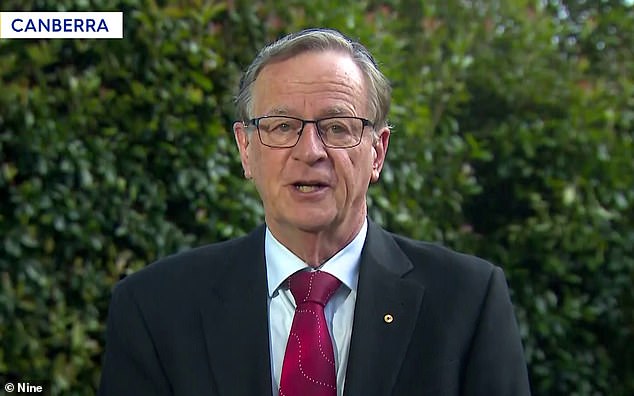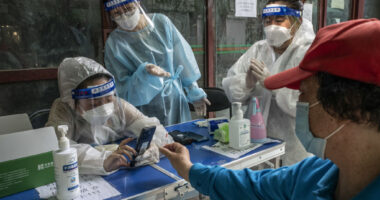
Coronavirus is sending fewer people to the hospital than a bad flu season despite cases threatening to top 100,000 around Australia.
Australian National University professor Peter Collignon said it was important to have perspective when looking at Covid hospitalisation and ICU numbers.
He said there were fewer hospital patients with Covid than those admitted with influenza during a recent winter.
‘We’re seeing a lot of people in hospital and a lot of people in ICU but we need to keep it in perspective,’ he said on the Today show Wednesday.


Top infectious diseases expert Peter Collignon revealed the number of people in hospital with Covid-19 was less than the number of patients admitted with influenza during a recent winter
‘It’s still less than what we often see in winter with influenza, for instance, a number of years ago, and it seems to be less of an issue than even six months ago with the proportion of infected people going into hospital.’
Professor Collignon said Australia’s high vaccination rate meant a smaller proportion of people required care in hospital, or dying.
‘So much so, that if you’re vaccinated your risk is probably similar to a season of influenza, it’s the one or two million unvaccinated adults we still have who are disproportionately in hospital and disproportionately in ICU,’ he said.
The expert reminded people worried about being infected with the virus that Australians didn’t have access to vaccines a year ago.
He said those who had their booster shot had a ‘much, much lower chance of coming into serious grief than a year ago’.


The top infectious diseases expert said it was important to have perspective when looking at hospitalisation and ICU numbers (pictured, shoppers walk in Melbourne)
‘A lot of us are going to get Covid over the next year or two, but the consequences now for serious disease – which is what matters – is so much less than a year ago, we need to come to terms with that,’ he said.
He said it was important to get more staff on the ground, decrease the fear level in society and ensure those vulnerable were at ‘the front of the queue’ for care.
Professor Collingnon was asked when he predicted Australia would hit the peak of the Omicron wave, and if infections would get worse before they got better.
‘My view is that it should start flattening out in at least in the next week, a lot of the cases we’re seeing is mainly being spread by people in their 20s and 30s, and you can see why because they were locked down for so long,’ he replied.
‘So as people are moving around less, more on holiday and interacting with large numbers less I think the numbers will come down.’


The expert said it was important to get more staff on the ground, decrease the fear level in society and ensure those vulnerable were at ‘the front of the queue’ for care
He said hospitalisations tended to lag five to seven days after infections levelled out, which he said were high, but not exponential.
Professor Collignon added that data observed from the Delta variant revealed that if a vaccinated person is naturally infected with Covid they build better immunity against the virus than what a booster shot could provide.
‘Providing you’re vaccinated, and if you’re unlucky enough to get Omicron, you are likely to have longer-lasting immunity than even with a booster,’ he explained.
‘Natural infection tends to give you long-lasting immunity mainly because you’re exposed to more parts of the virus rather than just the spike protein, which is the vaccine strategy.’
He urged unvaccinated people not to attempt to be infected naturally for the benefit of immunity as the chances of death or serious illness were much higher.
Experts predict Australia Day could be the day Omicron finally peaks in the major cities and the country could return to normal after that.


experts predict Australia Day could be the day Omicron finally peaks in the major cities in hopes the country can return to normal after that (pictured, a man is swabbed for Covid)
Major Australian cities could see a dramatic drop off in Covid-19 infections by the end of January as the Omicron surge ‘runs out’ of ‘core’ carriers to infect.
While new Covid cases topped 84,000 Australia-wide on Tuesday – including 38,000 in Victoria, 26,000 in NSW and 20,466 in Queensland – there are underlying signs that tally could dramatically improve by the end of this month.
So many of Omicron major carriers, people aged between 20 and 30, have been exposed already that the virus would began failing to reproduce when it meets people with immunity.
Initially that will happen in hotspots where the virus has run rampant, including areas of Melbourne and Sydney, and in Newcastle.
Catherine Bennett, chair of epidemiology at Deakin University, predicted the wave would start to turn around in about two weeks, before the end of January.









